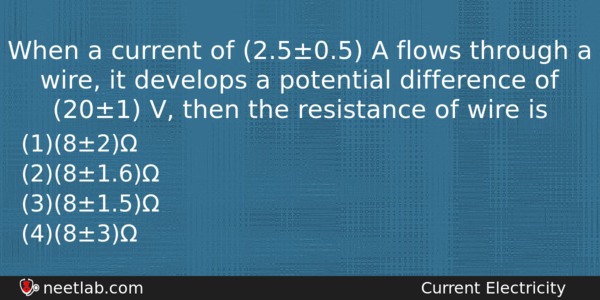| ⇦ | 
| ⇨ |
When a current of (2.5±0.5) A flows through a wire, it develops a potential difference of (20±1) V, then the resistance of wire is
Options
(a) (8±2)Ω
(b) (8±1.6)Ω
(c) (8±1.5)Ω
(d) (8±3)Ω
Correct Answer:
(8±2)Ω
Explanation:
No explanation available. Be the first to write the explanation for this question by commenting below.
Related Questions: - In n-type semiconductor, electrons are majority charge carriers
- A proton is moving in a uniform magnetic field B in a circular path of radius a
- An inductor 20 mH, a capacitor 50 μF and a resistor 40Ω are connected in series
- The pressure at the bottom of a tank containing a liquid does not depend on
- In a vessel, the gas is at a pressure P. If the mass of all the molecules
Topics: Current Electricity
(136)
Subject: Physics
(2479)
Important MCQs Based on Medical Entrance Examinations To Improve Your NEET Score
- In n-type semiconductor, electrons are majority charge carriers
- A proton is moving in a uniform magnetic field B in a circular path of radius a
- An inductor 20 mH, a capacitor 50 μF and a resistor 40Ω are connected in series
- The pressure at the bottom of a tank containing a liquid does not depend on
- In a vessel, the gas is at a pressure P. If the mass of all the molecules
Topics: Current Electricity (136)
Subject: Physics (2479)
Important MCQs Based on Medical Entrance Examinations To Improve Your NEET Score
18000+ students are using NEETLab to improve their score. What about you?
Solve Previous Year MCQs, Mock Tests, Topicwise Practice Tests, Identify Weak Topics, Formula Flash cards and much more is available in NEETLab Android App to improve your NEET score.
Share this page with your friends

R=V/I
R=20/2.5
R= 8 ohm
Now,
∆ R/R=∆ V/V+∆I/I
=1/20 +0.5/2.5
= 1/4
Therefore,
∆ R÷R=1÷4
∆ R=1÷4×R
∆R=1÷4×8
∆R=2
Therefore,
Resistance with error limits=R+ – ∆R
=(8+ – 2)ohm